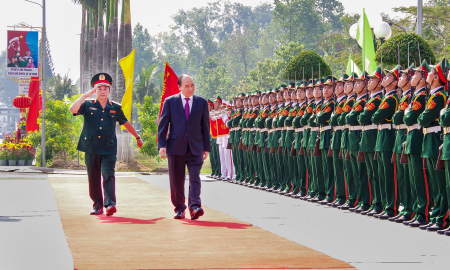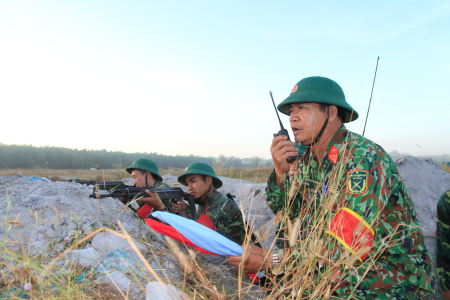Three breakthroughs in education and training at the Infantry Officer College No.2
Raising the quality of education and training is a central task throughout the Infantry Officer College No.2’s 60 years of construction, combat and development. In the upcoming years, the College determines to focus on realising three breakthroughs in order to train a contingent of battalion-level infantry staff officers for the Homeland protection.
 |
| Prime Minister Nguyen Xuan Phuc visiting the College in 2020 |
Improving the quality of education and training is a consistent policy by our Party and State, explicitly mentioned in the 11th Party Central Committee’s Resolution No.8 on “fundamentally, comprehensively renewing education and training to meet the requirements set by industrialisation and modernisation in a socialist-oriented market economy during international integration.” That is also a primary task of all schools. It is a task of urgency to the Infantry Officer College No.2 as a centre for training battalion-level military cadres in the South. In recent years, the College’s Party Committee and Board have formulated various measures for renewing and improving education and training and obtained many significant achievements. Between 2015 and 2020, 96.2% of the College’s cadets graduated with merit or distinction (increasing by 13.6% in comparison with the period of 2010-2015). The College’s teams took second place at the Army-wide Olympiad on Marxism-Leninism and Ho Chi Minh’s ideology in 2019, third place at the Army-wide English Olympic Contest in 2017 and 2019, and first place at the Military Sports Competition in 2017 and 2019. According to surveys conducted at several units, graduates from the College have fulfilled their task. The College’s prestige and status within the system of military schools and the national educational system have been gradually raised.
However, there have been some weaknesses in the College’s education and training. The curricula for several majors overlapped one another. The training contents have yet to keep pace with the development of reality. The reform in teaching and learning method has been still slow. The outcome of scientific researches has been limited. Levels of foreign languages and informatics as well as the capacity to use modern equipment, apply information technology, and approach advanced teaching method have been still poor. There have been shortcomings in the structure, experience and position of instructors. The number of instructors who had experienced combat has been decreased.
To further improve the quality of education and training, the Resolution of the College’s 15th Party Congress for the 2020-2025 tenure has determined to “focus on raising the quality of education and training in a substantive, comprehensive, solid manner and employing learner-centred teaching method relevant to graduates’ task and units’ training and combat readiness to meet the requirements set by the Military build-up in the new situation.” To that end, first of all, the College will concentrate on realising the breakthrough in standardising a pool of instructors and managerial cadres who play a key role in the quality of education and training. The College will enhance the work of cadre planning, cultivation and use, while standardising instructors’ qualifications, working style, teaching method, morality and lifestyle so that they will set good examples for cadets to follow. In addition to asking the Ministry of National Defence to supplement human resources, the College will select its graduates with distinction, top athletes at nation-wide and army-wide competitions, and good cadres from academies and schools both inside and outside the Military. However, such cadres will be carefully selected and recruited. More specifically, the Training Division will appraise their working capacity and professional expertise. The Division of Politics will inspect their political quality. Finally, the College Board will be in charge of recruitment. Grounded on the assessment of its cadres, the College will rotate positions amongst instructors and managerial cadres in order to develop each person’s capacity and strength and satisfy its development requirements in both long and medium terms.
In addition, the College will both organise on-the-spot training courses and dispatch its cadres to attend training courses at civilian and military schools. It will cooperate with the Department of Schools (Ministry of National Defence) in holding refresher courses on pedagogic method and informatics. Besides, it will send its cadres and instructors to hold positions at military units to enhance instructors’ teaching method and managerial cadres’ commanding and organising capacity. The College will place emphasis on managing its cadres and instructors’ political quality, working capacity, and relations. The work of evaluating, appointing, arranging and using cadres and instructors will be carried out seriously, closely, accurately. To give an incentive to its cadres and instructors’ self-improvement, the College will develop and promulgate the Regulation on job title standardisation, while implementing a preferential treatment policy for its staff members. Up to now, a contingent of cadres and instructors within the College has been consolidated and gradually standardised to meet the requirements set by education and training. The rate of cadres and instructors who have experienced postgraduate courses is 49.86%. 5.78% of the College’s instructors hold doctorate. The College has 18 associate professors. More than 50% of the College’s cadres and instructors have ever occupied positions within units.
The College will make a breakthrough in raising the quality of cadets both in university entrance examination and training process. To that end, all-level party committees and commands shall thoroughly, seriously grasp this breakthrough. The College will closely cooperate with localities and units in openly, democratically, sufficiently taking steps in military university entrance examination and appraising each examinee’s profile, morality, and fitness. Moreover, due attention will be paid to complying with the regulations on university entrance examination set by the Ministry of National Defence and the Ministry of Education and Training and fighting against all negative practices. Before each military university entrance examination, the College will attach great value to taking examinees’ incentive and love for the Military into consideration. Due regard will be paid to using managerial cadres with great abilities, good working style, and considerable experience in management and command and asking them to “work, live, and work with cadets,” particularly the first-year and second-year ones.
 |
| A tactical exercise |
In the education and training process, the College will direct its faculties and competent offices to review the system of textbooks and documents, eliminate the overlapping contents, maintain a balance between subjects, increase duration for practice, update the development of weapons, technical equipment, and military art, provide comprehensive but specialised knowledge in accordance with the specific training of infantry staff officers and the national education system. The College will promote a reform in teaching and learning method, remove the one-way teaching method, develop learners’ mentality and capacity to apply theories to practice, employ the method of raising issues, and give instructions on cadets’ scientific researches. A part from combat experience, consideration will be given to sharing experience in management and command and improving cadets’ soft skills. Significance will be attached to conforming to the regulations on examination and inspection, investigation and re-examination of training results at all levels, resolutely saying no to negative practices during examinations and merit-driven disease in education, stringently handling violations of the regulations, and ensuring the substantive, objective, correct evaluation of cadets’ study.
The College will implement a breakthrough in mobilising resources to standardise facilities and training equipment. In recent years, with the investments from the Ministry of National Defence, the College’s lecture halls and training equipment have been rather modern. Therefore, the College will direct offices and units to effectively exploit and preserve facilities. Hundreds of billions of VND will be spent on upgrading barracks, training grounds, and field training centres, building and completing infantry combat training and tactical training grounds and public sports zones, and installing modern equipment at the simulation training centre so as to increase the capacity to practise combat projects under the Military’s criteria and tactical indicators. It should be noted that the College has employed social resources to construct the Quang Trung - Nguyen Hue monument - cultural campus. This is a symbol of aspiration and belief and respect of the College’s cadres, instructors and cadets for a King, a talented military leader, and a hero of the Vietnamese people. Doing so would also enable the College’s cadres, instructors, cadets, employees and soldiers to apply the lessons on “being confident and daring, manoeuvring at lightning speed, seizing the golden opportunity, and taking effective actions” to their learning and working process. Moreover, the College will proactively upgrade the system of documents and its digital library, improve the quality of designing textbooks and documents, and ask higher echelons to supplement new-generation weapons and technical equipment to meet the teaching and learning requirements. Cultural, artistic, and sports programmes will be maintained to create a healthy military cultural environment within the whole College.
Inheriting and bringing into play the 60-year tradition of construction, combat and development of a heroic school named after the National Hero, Quang Trung - Nguyen Hue, cadres, instructors, cadets, employees and soldiers of the Infantry Officer College No.2 will continue heightening a sense of unity, proactively, creatively surmount all difficulties, and successfully fulfil all assigned missions to make contributions to building a revolutionary, standard, advanced, and exemplary school to deserve the title of “Hero of the People’s Armed Forces.”
Lt. Gen., Associate Prof. NGUYEN NGOC CA, PhD
Commandant of the College